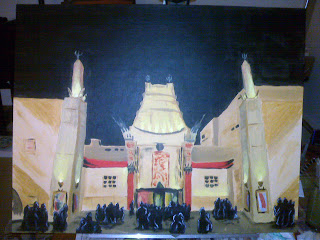I'm going to address now the massive logical fallacy put forth by the music (and movie) industry. Illegal downloads are taking money away from them and out of the pockets of the creators. They want the public to think that if everyone who downloaded an album or a movie didn't do that, they would buy it instead. I can only speak for myself, but that's bullshit. I reserve my movie dollars for very few things I really like. I go to the big screen for something like Star Trek. I'll buy something I really love, like The Shawshank Redemption. If I download, the most I'm doing is taking a dollar away from Redbox. And I use Redbox, too (see below to see what the MPAA thinks of Redbox). Or I go to the library. At least half of my cd collection is either copied from friends or bought used. No money to the RIAA there. Of the music I've acquired from friends, the library, or otherwise not paid full price for, I'd say most I would have never purchased at all. These days I'm doing a lot of online radio listening. I hear tons of music I like but I'll never buy. I throw a little money in every now and then to help my favorite independent stations, but that's it. Let me see if I can summarize my point:
It's not a matter of buying vs stealing. It is a matter of experiencing vs not experiencing.
I'd also like to take a moment to give a shout out the the original, old school, grandaddy of us all "analog" Torrent site, the Library. (with special nods to public, college and high school libraries)
Just a few more tidbits for thought on my posts about the state of the music industry. The MPAA (Motion Picture Association of America) has been raving, like the RIAA, about how illegal movie downloads are killing the movie business. The MPAA has even opposed cheap services like Redbox despite the evidence showing just the opposite. So how can the MPAA say downloads are hurting when, yet again, 2009 was a record year for box office profits. This during the worst economic climate since the Great Depression.
If movies and music are analogous, why hasn't the music industry seen increases in the same way? Several likely reasons:
Many studies including this one have shown that illegal downloaders spend more money on music than those who don't download. Other studies show that digital sales are increasing. So why is the RIAA in a twist? Music is too expensive. $12-15 for a cd and $1 or more per song download are just too much. And studies are backing this up. For some reason, rather than charging what the market will bear, the music industry has picked artificially high prices. The consumer is finally catching on and deciding they don't want to pay that much for a cd. If you want people to pay that much, you have to give more than a little plastic disk.
The way we deliver music is outdated and being replaced by a system we don't fully understand yet. Brian Eno made the fine comparison of records to whale blubber. Oil replaced whale blubber as fuel. Cars replaced the horse and buggy. Transistors replaced vacuum tubes. We make ice in our own freezers rather than having it delivered. Technology moves on. In some cases the old ways die out, in others they adapt to new niches. My desktop computer would fill the room if it still had tubes, but many a guitar player would be lost without a tube amp. You can still ride a horse and buggy, but you do so for fun, not because it's the best way to get around.
People just don't like music that much anymore. It's a hard pill to swallow but I think it's true. I'm forgetting where I read or heard this, but it's related to the Brian Eno remarks. In the history of music, the multi-million album sales and heaps of money thrown around in the 80s and 90s are an anomaly, not the norm. Operating an industry on that scale wasn't sustainable. Video game sales have outpaced music for a few years now, and have passed home dvd sales. Internet, cable, satellite. There are so many sources for entertainment and information. Music is going to have to accept that it isn't on top of the heap anymore.
So, back to the artist. What do I think? I think I make art and that's a lot better than not making it. I'd feel sympathetic towards those who can't make a living anymore in music, but so far I haven't found any examples. I'm not entitled to make a living at music and neither is anyone else. I'm not entitled to anything but the right to make art. Hell, even Ray Alder of Fates Warning had a day job during their heyday. I have a job so I can make art. On one level, only making a small part of my income from my art makes me an amateur and not a professional. On the other hand, being free to make whatever art I want, when I want, to make myself happy, means that I am successful. And being successful in my art makes me happy with what I have to be happy with.
(is it perhaps ironic that these people are watching television and not listening to music?)
(slightly related, I link to Techdirt a lot. A great read for tech/copyright/what's next/that's a dumb law info)








